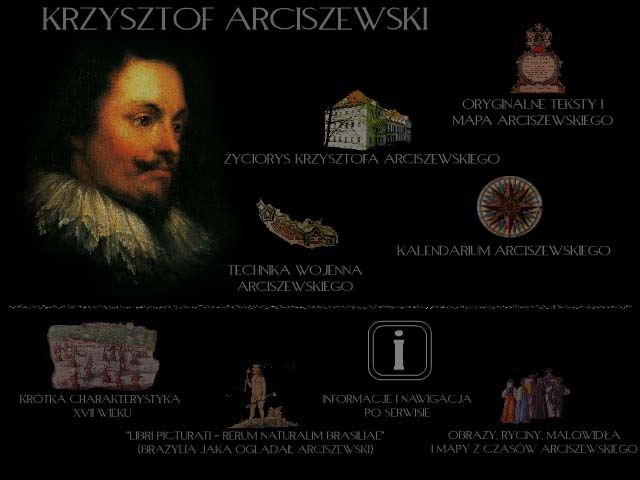
Born: December 1592, Rogalin, Polish-Lithuanian Commonwealth
Died: 1656, near Gdansk, Polish-Lithuanian Commonwealth
The early days. Arciszewski was born into an Aryan noble family. His father, Eliasz Arciszewski, was an estate owner.
Campaign; murder. During 1621-22 Krzysztof took part in the Livonia (Inflanty) campaign of Krzysztof Radziwill. In 1623 he murdered, along with his brothers, Jaruzel Kacper Brzeznicki (vel Brzezinski), who was a lawyer who had brought the Arciszewski family to financial ruin. For this murder he was sentenced to infamy and banishment from Poland.
Studies in Holland; participates in 30-year war. In 1623 Arciszewski arrived in Holland where, thanks to financial support of Radziwill, he studied military engineering, artillery and navigation at Leyden University. He participated in the 30-year war on both sides of the conflict. He defended Breda under the command of Prince Maurice of Orange and then in 1629 he moved to France where – as a soldier of cardinal Richelieu - he took part in the capture of the Protestant fortress La Rochelle, among others.
Expedition against Spain. In November 1629, Arciszewski enlisted as a captain in the West Indies Company. He arrived in Brazil together with a seven thousand strong Dutch expedition against Spain and Portugal. He took part in many battles and skirmishes and thanks to his bravery rapidly advanced to the rank of the general of artillery of the Netherlands and the rank of the admiral of Brazil. He stormed the fortresses Olinda and Recife. Under his command a Dutch landing party captured the islet Itamarica. His most famous military achievements are: the capture of the fortresses Arrayal (Castello Real) and Porto Calvo as well as the siege of Nazareth.
Vice-governor of Dutch Brazil. In 1637, Arciszewski became the vice-governor of Dutch Brazil, a subordinate to Count Maurice de Nassau-Siegen. He briefly became the commander-in-chief of the Dutch forces in Brazil however disagreements with de Nassau forced him to return to the Netherlands in 1637. In 1638, a poor military situation in Brazil forced the Netherlands to send him back there. However, de Nassau felt threatened and influenced the Political Council for the Colonies to relieve Arciszewski from the service and send him back to the Netherlands. The General States (Dutch parliament) did not accept this decision but Arciszewski’s ambition caused him to resign despite their overriding judgement.
Ethnographic work. During his stay in America, Arciszewski recorded his observations regarding Indian tribes. He sent his notes to the Netherlands to Gerard Voss who in 1642 published them in Amsterdam "De theologia gentili et physiologia christiana sive de origine et progressu idolatriae" in which he enthusiastically quoted fragments from Arciszewski’s work. Seventeenth century Dutch researchers highly regarded Arciszewski’s ethnographic observations. Later they were however forgotten for over 200 years.
General of crown's artillery. Arciszewski returned to Poland in 1646 and accepted King Wladyslaw IV Waza's (Vasa) offer to become a general of crown’s artillery (“starszy nad armata”) and commandant of the arsenals. As a reward, he obtained a stewardship in the Bytow and Lebork lands. He executed many important reforms and improvements in artillery, fortifications and military architecture. He built pontoons to be used to cross the rivers Dniestr, Prut and Donau in case of war with Turkey.
Fights against Cossacks and Tartars. In 1648-49, during the reign of Jan II Kazimierz Waza (Vasa), Arciszewski took part in the wars against the Cossacks and the Tartars. He commanded the defense of Lwow (Lviv), took part in the relief of Zbaraz and fought at Zborow and Pilawce. His ambition prevailed however, when in 1650, as a result of a conflict with Chancellor Jerzy Ossolinski who was then promoted to be generalissimo, he resigned from all his posts and retired. He died in 1656 near Gdansk and his remains were supposedly brought to Leszno and buried at the Aryan church. Polish troops of Grzymultowski, chasing the fleeing Swedes, burnt the town and church with Arciszewski’s remains as a retaliation for the reception of the Swedish garrison during the Swedish invasion.
Translated and compiled from the following Polish sources:
Wikipedia
Green Devils
Prawo i Zycie
Gazeta Kolobrzeska
Return to home page:
Prominent Poles